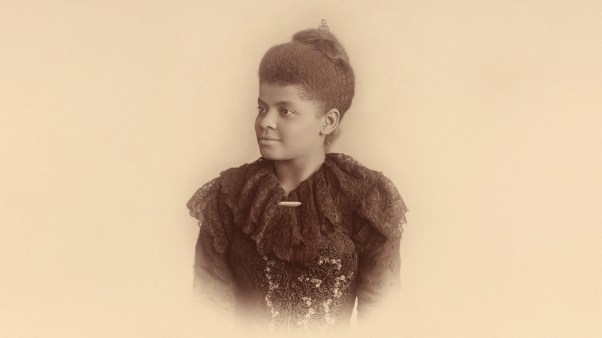Got a question? Email advice@christianitytoday.com to ask CT’s advice columnists. Queries may be edited for brevity and clarity.
Q: In a post on our neighborhood Facebook page, a distraught lesbian woman said all Christians with traditional views of sexuality are bigots and she feels “unsafe” entering these churches when they’re used as polling places. Many people agreed with her. My husband is the pastor of one of those neighborhood churches. How can we be a witness of Christ’s love in our neighborhood while also keeping our orthodox biblical views? —Maligned in Michigan
Karen Swallow Prior: I sense a hint of shame or awkwardness that’s understandable when interacting with someone who may feel anger toward us. We all want to be treated with kindness and respect even amid disagreement on essential matters, and it may be helpful to turn questions like this around: How would we like to be treated by people whose views differ from ours?
After all, those of us in America who hold orthodox views of sexuality are increasingly in the minority, facing greater hostility and alienation from the wider culture. Perhaps we are even approaching the same level of stigma once borne by LGBTQ people.
In this sense, the early church grew in a context similar to our own. Those first Christians lived in an extremely sexually depraved culture. Yet while the New Testament describes the effects of sexual sin for all (1 Cor. 6:12–20), it prescribes a sexual ethic only for those in the church (5:12). We know that this ethic is good for the flourishing of all. Yet that goodness needs to be displayed in our own lives for others to understand and believe that truth.
So as Christians, we can model holding strong convictions in a posture of love and care for all our neighbors. On your block, that can be as simple as deliberately being the first to offer a friendly wave.
 Illustration by Jack Richardson
Illustration by Jack RichardsonKaren Swallow Prior lives in rural Virginia with her husband, two dogs, and several chickens. Following a decades-long vocation as an English professor, Karen now speaks and writes full-time.
Q: I’ve spent the past nine years studying theology academically and want to step into full-time ministry. But I come from a nondenominational background and so don’t have the ease of relying on a recognized denomination for a straightforward path into a ministry role. What advice would you give to a soon-to-be new grad seeking opportunities in ministry without the backing of a denomination? —Teachable in Texas
Kevin Antlitz: Whether this step is a disappointment or has always been part of your plan, I am not surprised. Good work can be hard to find, especially in the church and the academy.
You are right to mention the value of denominations. Denominations are essentially formalized networks of relationships that foster alignment in doctrine, culture, and practice. They narrow the scope of opportunities in the best way and can make it easier to find a position where you can flourish. But it’s still not easy. Finding a good position in a healthy church is more art than science—but here is some advice.
To begin, use your gifts in your local church right now. Whether this leads to a job or not, it is essential to have a community that confirms your call and is built up by your pastoral ministry. If you’re not currently serving in your local church, that’s the first move.
Next, search for a pastoral residency. These are two- to three-year pastoral positions that offer hands-on training and formation in a local church. Much as teaching hospitals train new doctors, residencies train new pastors. I’m not sure there’s a better way to learn the art of pastoring.
This too might be easier in a denomination, but the first place I’d look is Made to Flourish (an organization with which I am affiliated). It supports a diverse network of churches that offer residencies. Godspeed!
 Jack Richardson
Jack RichardsonKevin Antlitz is an Anglican priest at a Pittsburgh church positively overflowing with kids. He and his wife have three young children who they pray will never know a day apart from Jesus.
 Illustration by Silvia Reginato
Illustration by Silvia ReginatoQ: My congregation is small and skews young. Among the handful of folks over 50 are an elder and his wife. She reliably greets and talks to me on Sundays, but he has never engaged with me or, to my knowledge, anyone except his adult children, who also attend. I realize some people struggle with social anxiety, but I find this behavior from a church leader off-putting. Is this worth mentioning to the pastor? —Hesitant in Hawaii
Kiara John-Charles: Being an elder is a significant responsibility within a church (Titus 1:6–9). It comes with high expectations and, often, time-consuming duties. Whatever the details, this is a role to be marked by wise counsel and leadership stemming from a mature relationship with Christ.
However, sometimes we may blur the line between biblical or church-assigned responsibilities and our personal expectations of people in ministry. Is this a failure of leadership or a clash of personalities? As you mentioned, this elder may struggle with social anxiety. Have you tried being the one to initiate a conversation with him?
I also encourage you to reflect on your desire to bring this concern to the pastor. What about the elder’s behavior do you find off-putting, and why do you want to engage with him? Sometimes we construct narratives in our minds that leave us needlessly offended or uncomfortable. While it may feel intimidating, try to start a meaningful conversation with the elder before you consider bringing in the pastor (Matt. 18:15).
Finding a point of commonality can open the door to connection. Try discussing the sermon or inviting him and his wife out for coffee. You might be pleasantly surprised—this could resolve your concern quite quickly. And in the process, you may also develop an authentic relationship with another leader of your church.
 Illustration by Jack Richardson
Illustration by Jack RichardsonKiara John-Charles is an LA native with Caribbean roots and a love for travel and food. She works as a pediatric occupational therapist and serves at her local church in Long Beach, California.

















